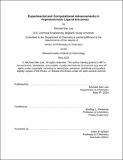Experimental and Computational Advancements in Peptidomimetic Ligand Discovery
Author(s)
Lee, Michael Alan
DownloadThesis PDF (71.01Mb)
Advisor
Pentelute, Bradley L.
Terms of use
Metadata
Show full item recordAbstract
The usage of peptides as therapeutics is a growing area of interest within the pharmaceutical industry for the facilitation of protein-protein interactions (PPIs). Peptides inhabit a unique therapeutic space because of their high levels of chemical customization balanced with their potential for high specificity due to a wide variety of potential structures. At the same time, discovery tools for finding peptides that modify PPIs have evolved, including advances in affinity selection techniques and combinatorial chemistry. Specifically, the usage of solid phase peptide synthesis for split-and-pool chemistry allows for rapid access to highly diverse (>108 total sequences) compound libraries for use in ligand discovery. A primary technique for in vitro ligand discovery is affinity selection-mass spectrometry (AS-MS), which utilizes tandem mass spectrometry to decode complex mixtures of peptide ligands pulled down from a peptide library through affinity selection. This approach provides unique advantages due to the high levels of chemical customization that can be performed on synthetic peptide libraries, including the incorporation of unnatural amino acids or the modification of library structure through macrocyclization.
This thesis will focus on the development of experimental and computational tools to analyze affinity selection datasets more efficiently and thoroughly. We demonstrate the synthesis of macrocyclic peptide libraries that increases the diversity of synthetic macrocyclic libraries while utilizing accessible, efficient chemistry for cyclization. These libraries are then used for the discovery of novel ligands to two proteins. Structure activity relationships are established for one of these ligands and its affinity is matured through the usage of focused libraries containing a variety of unnatural amino acids. Additionally, we investigate a variety of resins used for solid phase peptide synthesis, particularly in the synthesis of small domain proteins or difficult peptide sequences.
Because of the high amounts of peptides synthesized and pulled down by AS- MS experiments, efficient computational methods are crucial for effective ligand discovery efforts. Here, we discuss two methods of expanding data analysis, first by a sequence-independent enrichment quantification. AS-MS experiments operate using the decoded peptide sequence from tandem MS/MS data to nominate potential hit peptides, but that process depends on the efficient fragmentation of a
4
target peptide and the quality of the subsequent MS2 spectrum. We utilize techniques to identify putative hits through the comparison of peptide enrichment based only off mass-to-charge ratio without an assigned sequence, allowing for label free MS1 quantification. The second method utilizes machine learning techniques to rationalize trends in successfully sequenced peptide sequences from AS-MS experiments with respect to target proteins. This approach allows for the creation of a ligand “sequence space”, which allows for the incorporation of unnatural amino acids in ligand discovery.
Overall, this thesis presents a variety of methods to enhance the scope of peptide-based drug discovery. We anticipate this work to accelerate the process of drug discovery through a diversification of peptide structure combined with more powerful computational analytics.
Date issued
2024-05Department
Massachusetts Institute of Technology. Department of ChemistryPublisher
Massachusetts Institute of Technology